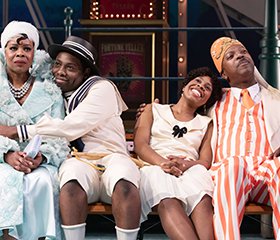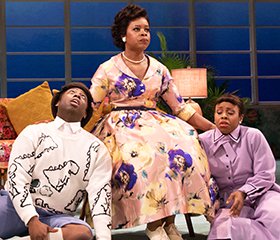At the core of The Skin of Our Teeth, which finishes its run this weekend, is the Antrobus family, and I couldn’t finish my blog without speaking to Paige Gilbert and Julian Robertson, who play that family’s children: Gladys and Henry.
Both actors confessed a certain amount of perplexity when they initially encountered Thornton Wilder’s text. “It was a difficult read,” Gilbert said. “I wasn’t certain what to make of it.” Echoed Robertson: “At first, I wasn’t sure what was going on. It was a cloudy picture. But once we got into rehearsal things got clearer.”
It's easy to see why the play can be daunting. “The scale seems so epic,” Gilbert said. “At the end of the first act, ice moves in. At the end of the second, there’s a huge flood. In the third act, there’s the aftermath of war. People are trying to process unspeakable horrors. Horrors that keep happening.”
For both actors, the way in to the play was to focus on the Antrobus family. “The world is coming apart in huge ways,” Robertson said. “But so is the family. That makes the story relatable.” “If you look at the play,” Gilbert said, “as a grand tale of survival it can be too overwhelming. But if you look at the specific family dynamics than you have more clues as an actor.”
Burrowing in on those dynamics: what does Gilbert’s Gladys think of Henry? “I’ve had to find a very nuanced view of him,” Gilbert responded. “Henry has committed acts of violence, but Glady isn’t afraid of him. She’s a good student, and she knows that by comparison Henry makes her look better in the eyes of their parents. Gladys and Henry have a kind of love/hate relationship, but when it’s time to band together she’s there for him.”
“They have a sibling rivalry,” commented Robertson. “Gladys is much closer to what my parents want and what I should have been. But however much Henry screws up he still wants to be a part of that family. If he didn’t he would have run away for good long ago.”
Robertson explained Henry’s anti-social behavior as “coming from Henry’s frustration at not being able to get what he wants. He feels that other people have had things that he didn’t have. He’s going to make it right for himself. Plus, his father is a famous inventor and a pillar of the community. Henry feels the pressure of living up to that. He's supposed to be his father’s legacy.”
Wilder’s text gives us Henry as a kind of Cain in the biblical sense: the sibling who uses violence and is stigmatized for it. I asked Gilbert to name an archetype for her character. “I can’t give you a classical one. But I can say that she is the ‘perfect woman’ – smart and beautiful but not overconfident. Her archetype is to be the hope of the future – which is reinforced in act three when she has a baby.”
As for the future of Gilbert and Robertson themselves, Gilbert, who grew up in Detroit and studied acting at SUNY/Purchase, told me she would love to explore the lighter side. “It would be great to be in a comedy at somewhere like HBO.” Robertson, who grew up in Jacksonville, Florida, is keeping his options open. “I may take a minute to take stock of things. I only recently finished my studies at Juilliard across the street from the theater. For the last few months it’s been surreal to hop off the train and turn in the other direction, towards Lincoln Center Theater. It’s been great and I’m grateful.”
Brendan Lemon is the editor of lemonwade.com

